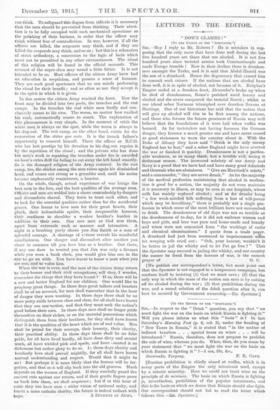LETTERS TO THE EDITOR.
" DOWN GLASSES ! "
[TO THE EDITOR OF THE " SFECTATOR.1
SIR,—May I reply to Mr. Robson ? Ho is mistaken in sup- posing that the only races that have done well during the last five hundred years are those that use alcohol. It is not five hundred years since teetotal armies took Constantinople and made Europe tremble ! Now in their decline there is drunken- ness amongst the Turks, and it is said that Abdul-Harnid was the son of a drunkard. Hence the degeneracy that caused him to commit such crimes. If the nations that use alcohol have done well, it is in spite of alcohol, not because of it. Babylon's Empire ended at a drunken feast, Alexander's broke up "when he died of drunkenness, Rome's perished amid luxury and alcohol and she never conquered the teetotal Nervii ; whilst in our island sober Normans triumphed over drunken Saxons at Hastings. One of our historians has said that the nation that will give up alcohol will rise to be fast among the nations, and those who foresee the future greatness of Russia may well believe that the foundations of it were laid when vodka was banned. As for teetotalers not having foreseen the German danger, they foresaw a much greater one and have never ceased as good statesmen to warn the country about it. With the Duke of Albany they have said "Drink is the only. enemy England has to fear," and a sober England might have averted the war or finished it quickly. Drunkenness is not a pardon- able weakness, as so many think, but a terrible evil, seeing it dethrones reason. The increased sobriety of our Army and Navy is a proof that we have had and have many good Admirals and Generals who are abstainers. " Give me Havelock's saints," said a commander, " they are never drunk." As for the majority of the medical profession maintaining that alcohol in modera- tion is good for a nation, the majority do not even maintain it is necessary in illness, as may be seen in our hospitals, where milk has mainly replaced alcohol ; and as for drunks being " a few weak-minded folk suffering from a loss of will-power which may be hereditary," there is probably not a single pro- fession in which some of the most brilliant have not succumbed to drink. The drunkenness of old days was not so terrible as the drunkenness of to-day, for it did not embrace women and boys and girls, and beer was pure and home-made and brandy and wines were not concocted from " the washings of casks and chemical abominations." I quote from a trade paper. A drunkard had just been sentenced to imprisonment when his weeping wife cried out : " Och, your honour, wouldn't it be better to jail the whisky and to let Pat go free ? " That the Spectator may succeed in jailing the whisky, and our country the sooner be freed from the horrors of war, is the earnest [We publish our correspondent's letter, but must point out that the Spectator is not engaged in a temperance campaign, but confines itself to insisting (1) that we must save ; (2) that the only way in which the mass of the nation can save is by cutting off its alcohol during the war ; (3) that prohibition during the war, and a sound solution of the drink question after it, can best be secured by Government ownership.—En. Spectator.]


































 Previous page
Previous page